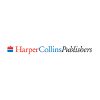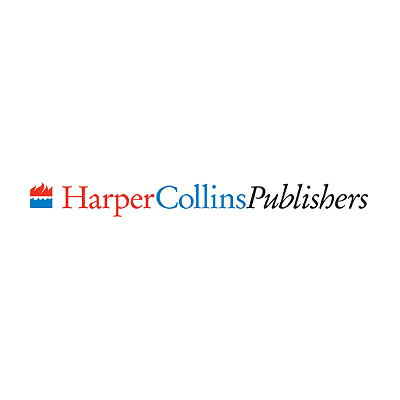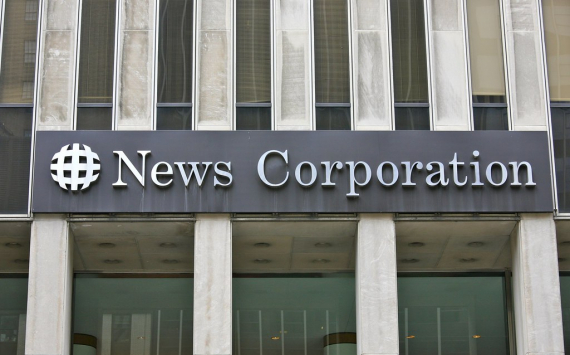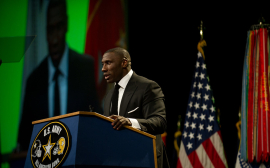Description
HarperCollins Publishers LLC — one of the largest publishing companies in the world, is one of the" big five " English publishers, along with Hachette, Holtzbrinck/Macmillan, Penguin Random House and Simon & Schuster. The company is headquartered in New York City. It is a subsidiary of News Corp. The company name is made up of the names of several publishing firms: Harper & Row, whose name was the result of an earlier merger between Harper & Brothers and Row, Peterson & Company, and the British publishing company William Collins, Sons.
The publisher's executive director is Brian Murray. HarperCollins has publishing divisions in 18 countries, including the United States, Canada, the United Kingdom, Australia, New Zealand, and India. The company is published under a variety of different imprints, both former independent publishers and new ones. The company's turnover in the 2015/16 financial year was $ 1.646 billion out of News Corp's $ 8.292 billion total turnover.
History
Harper
The Harper Publishing House was founded in New York City in 1817 by brothers James and John Harper under the name J. & J. Harper. Later, their younger brothers Wesley and Fletcher began working in it, and in 1833 it became known as Harper & Brothers. In the 1840s, Thackeray's Vanity Fair, Charlotte Bronte's Jane Eyre, and Emily Bronte's Wuthering Heights became bestsellers, and Harper's Illustrated Bible was published in 1844. In June 1850, Harper's New Monthly Magazine (Harper's Magazine) was launched. By December 1853, Harper had 41 printing presses. The machines worked for 10 hours a day and produced 25 books per minute, the company's turnover reached $2 million a year. However, on December 10, 1853, the building of the publishing house almost completely burned down, losses exceeded $1 million, of which insurance covered only 20 %. Only a year and a half later, the publishing house resumed work in two new buildings in Franklin Square. In 1857, another magazine, Harper's Weekly, was founded, and in November 1867, a third, Harper's Bazaar (later Harper's Bazaar). In 1867, James Harper died, in the 1870s, his three brothers died and the publishing house passed to their children. In 1895, a contract was signed with Mark Twain for the exclusive right to publish his books.
Despite the fact that by the end of the XIX century, the name Harper became almost synonymous with publishing in the United States, the company periodically experienced financial difficulties. In 1896, Harper & Brothers became a joint stock company and received financial support from John Morgan, but this did not save the company from bankruptcy in December 1899. Control of the company passed from the Harper family to Colonel George Brinton McClellan Harvey, with the approval of Morgan and other creditors. In the first fifteen years of the twentieth century, Harvey tried to restore the publisher's somewhat tarnished reputation by hosting lavish banquets for statesmen, famous authors, and the New York elite. However, this did not solve the financial problems, in 1913 the magazine Harper's Bazar was sold, and in May 1915 Colonel Harvey was replaced by Clinton Brainard. Brainard's policy was to reduce the company's debt, but his success was dubious: in 1916, Harper's Weekly was sold, and writers such as Theodore Dreiser, Joseph Conrad, and Sinclair Lewis left the publishing house. In 1923, the buildings in Franklin Square were sold to J. P. Morgan & Co. for $400,000, and the publishing house moved to 49 East 33rd Street.
In April 1962, Harper & Brothers merged with Row, Peterson & Company (an Illinois textbook publishing company) to form Harper & Row Publishers, Inc. In the following two decades, several publishers were absorbed, such as T. Y. Crowell (1977), J. B. Lippincott (1978), Zondervan Books (1988), and Scott, Foresman (1989). In 1983, Harper's shares began to be listed on the New York Stock Exchange. In March 1987, the Harper Company & Row Publishers was taken over by Rupert Murdoch's conglomerate for $300 million.
Collins
The publishing house William Collins, Sons was founded by William Collins in 1819 in Glasgow. Initially, the company published only dictionaries and Christian religious literature. In 1840-1842, the publishing house began publishing illustrated dictionaries, and received a license to print the Bible.
After leaving the company in 1846, William took over the management of his son-William II, who began to publish the works of Shakespeare and literature available to the masses. In 1856, the company began to produce atlases and still maintained a monopoly on the publication of the Bible. In 1872-1879, branches were opened in Australia and New Zealand. After the death of Wilhelm II, in 1895-1906, the management passed to his son-Wilhelm III, who introduced children's fiction to the company. After William III, his nephews, William IV and Godfrey, became stewards. Godfrey developed the direction of "books for millions — - cheap editions of classical literature. The first offices were opened in South Africa and South America.
In 1919, Collins published her own original fiction. Among the authors later published at William Collins, Sons were such writers as C. S. Lewis, Agatha Christie, and J. R. Tolkien. In 1981, there were changes in the composition of the company's shareholders — the family sold its share to Rupert Murdoch.
Mergers and acquisitions
In 1989, Collins was bought by Rupert Murdoch's News Corporation and merged with Harper & Row. Combined were not only the names of the publishing companies, but also their logos, which formed a stylized image of the flame at the top of the wave. In 1999, News Corporation acquired the Hearst Book Group, consisting of William Morrow & Company and Avon Books. These brands are now imprints of HarperCollins.
Continuing to expand, HarperCollins acquired Thomas Nelson in 2011. The deal was completed on July 11, 2012 with the announcement that Thomas Nelson, given its position in Christian book publishing, would retain autonomous management. Thomas Nelson and Zondervan were reorganized into a new imprint group, HarperCollins Christian Publishing. Former Thomas Nelson executives played a key role in the reorganization.
In 2014, News Corp bought the Toronto-based Harlequin publishing house, formerly owned by Torstar Corp (publisher of Canada's most popular newspaper, the Toronto Star). The main direction of the Harlequin publishing house is women's novels. The transaction amount was $ 415 million. Harlequin Publishing house was founded in 1949 and has printed 6 billion books in its history.
Closing of US warehouses
The HarperCollins warehouses in Williamsport and Grand Rapids were closed in 2011-2012. In November 2012, the delivery and storage operations in Indiana were merged with R. R. Donnelley, resulting in the closure of two HarperCollins warehouses. The Scranton, Pennsylvania warehouse closed in September 2013, and the Nashville, Tennessee warehouse closed in the winter of 2013. Several HarperCollins offices and departments continue to operate in Scranton, but in a different location. The closure of the Scranton warehouse eliminated about 200 jobs, and the closure of the Nashville warehouse eliminated up to 500 jobs (the exact number of book distribution employees is unknown).
Activity
HarperCollins is the second most important division of Rupert Murdoch's News Corp media holding, behind its newspaper division, which includes a number of major newspapers in the US, UK and Australia. In turn, HarperCollins consists of the following divisions::
- HarperCollins Canada is a Canadian division that has survived since the days of William Collins, Sons & Co. Ltd.
- HarperCollins Children's Books — books for children.
- HarperCollins Christian Publishing-formed on the basis of the publishing house of Thomas Nelson, founded in 1798; headquarters in Nashville (Tennessee).
- HarperCollins Australia-The core of the Australian division is the Sydney-based publisher Angus & Robertson (founded in the 1880s), which was absorbed in 1989.
- HarperCollins India-launched in 2003 as a joint venture between Living Media and HarperCollins. This merger made HarperCollins India a major publisher in India. HarperCollins took full control of the company in late 2012.
- HarperCollins UK is a division in the United Kingdom. It publishes about 1,000 titles a year, and employs 900 people in London, Glasgow, and Honley.
- Harlequin-Headquartered in Toronto. It publishes an average of 110 book titles per month in 34 languages in 110 countries.
About 99 % of HarperCollins ' books are published in English (excluding Harlequin, which publishes 40% of its books in other languages). The company also has offices in non-English-speaking countries: HarperCollins Germany (Germany), HarperCollins Español (books in Spanish, headquartered in Nashville, Tennessee), HarperCollins Ibérica (Madrid, Spain), HarperCollins Japan (Japan), HarperCollins Holland (Netherlands), HarperCollins Nordic (Scandinavia), HarperCollins Polska (Poland).
The catalog of HarperCollins names includes about 200 thousand items, of which 100 thousand are available in electronic format. Sales of e-books (including audiobooks) in the 2015/16 financial year accounted for 19% of total revenue of $ 1.646 billion.
Imprints
HarperCollins has more than 120 book imprints (book brands or trademarks), most of which are based in the United States. Collins still exists as an imprint, mainly for wildlife and natural history books, guidebooks, and English and bilingual dictionaries.
On February 8, 2013, it was announced that some of the Collins literature would be merged with the HarperPress literature as a new William Collins imprint.
Network approach
In order to increase the volume of book sales and enter the online market, HarperCollins has created a viewing function on its website, with which users can read some excerpts from books before buying. Some publishers have concerns about this approach, as they assume that online books can be used in the exchange of files between users. From 2009 to 2010, HarperCollins operated the Bookarmy social network.
In early October 2013, the company announced a partnership with the online digital library Scribd. From the official statement, it became clear that the subscription to Scribd will include most of the books from the HarperCollins US and HarperCollins Christian catalogs. Chantal Restivo-Alessi, director of digital technology at the publisher, told the press that the deal represents the first time a publisher has released such a significant portion of its catalog.
Speech Bureau
HarperCollins Speakers Bureau (also known as HCSB) is the first public speaking agency created by a major publishing house. It was launched in May 2005, as a division for ordering speeches to authors of the publishing house and publications of its subsidiaries. The director is Andrea Rosen.
HCSB's most notable authors include Carol Alt, Dennis Lehane, Gregory Maguire, Danny Meyer, Mehmet Oz, Sidney Poitier, Ted Sorensen, and Kate White.
Reorganization of payments
In 2008, as an experiment, a division of HarperStudio was opened, which was supposed to organize the publisher's relations with authors in a new way. The approach of HarperStudio is to pay a small advance or not pay it at all, but in return to share with the author the publisher's profit in the ratio of 50 % to 50 % (instead of the standard 15 %). The department was headed by Bob Miller, who had previously founded Hyperion, the adult book division of Walt Disney. HarperStudio closed in March 2010 after Miller left for Workman Publishing.
The manual
- Brian Murray-President and Chief Executive Officer (CEO) of HarperCollins since 2008, at the company since 1997;
- Michael Morrison-President and Editor of the US and Canada divisions since 2008, at the company since 1999;
- Susan Murphy-President and Editor of HarperCollins Children's Books since 2015;
- Mark Schoenwald-President and CEO of HarperCollins Christian Publishing since 2012;
- Charlie Redmayne-CEO of HarperCollins UK since 2013;
- Craig Schweinwood has been the publisher and Chief Executive Officer of Harlequin since 2014.
Criticism
"East and West»
The company became embroiled in a scandal in 1998 after it was revealed that it had refused to publish Chris Patten's (the last British governor of Hong Kong) book East and West after direct intervention by the then CEO of News International Rupert Murdoch. Later, Stuart Proffitt, an editor who worked on the book for HarperCollins, said that this intervention was intended to appease the Chinese authorities (whom the book criticized), as Murdoch intended to expand his business empire in China and did not want to cause problems that would arise after the publication of this book. Murdoch's intervention led to Proffitt's dismissal and outrage from the international media. Chris Patten later published in the publishing house Macmillan Publishing with the caption "the book that Rupert Murdoch refused to publish". After a successful legal campaign against HarperCollins, Patten published the book in the UK in September 1998, and received £500,000 in compensation and an apology from Rupert Murdoch.
"If I did It"
"If I Did It" is a book published by Fr. Jay Simpson on his alleged murder Nicole Simpson, who caused a negative reaction in the United States and became the cause of a lawsuit for the right to publish.
Ben Collins
In August 2010, the company was embroiled in a legal battle with the BBC over the publication of a book that later turned out to be the autobiography of a racing driver Ben Collins, who revealed his identity Stiga from the show Top Gear. In a blog post, Top Gear executive producer Andy Wilman accused the publisher of "wanting to profit" from the BBC's intellectual property and called the publishers "a bunch of crooks." On September 1, a request for an injunction against publishing the book was rejected, confirming that Collins was indeed a "Stig".
E-books
In March 2011, HarperCollins announced its intention to distribute e-books to DRM-protected libraries, which provide the ability to delete a book after it has been used 26 times, drawing criticism, in particular, for likening books that are exclusively digital to traditional paperbacks that wear out over time.
United States v. Apple Corporation
In April 2012 The US Department of Justice filed a lawsuit against Apple, HarperCollins, and four other major publishing companies. The lawsuit alleged that the companies conspired to fix e-book prices and weaken positions Amazon.com in the market, thus violating the antimonopoly legislation.
In December 2013, a federal court approved an antitrust claim that HarperCollins and other publishers should invest in a fund that would top up the accounts of customers who overpaid for books due to price fixing.
Israel on the atlas
In December 2014, the magazine The Tablet reported that Israel is not marked on the map of the Middle East in the atlas published for Middle Eastern schools. A spokesman for Collins Bartholomew, a subsidiary that specializes in maps, explained that including Israel would be "unacceptable" for their customers in Arab countries Of the Persian Gulf, and therefore the marking was omitted in accordance with"local preferences". The company later apologized and destroyed all the books.

























